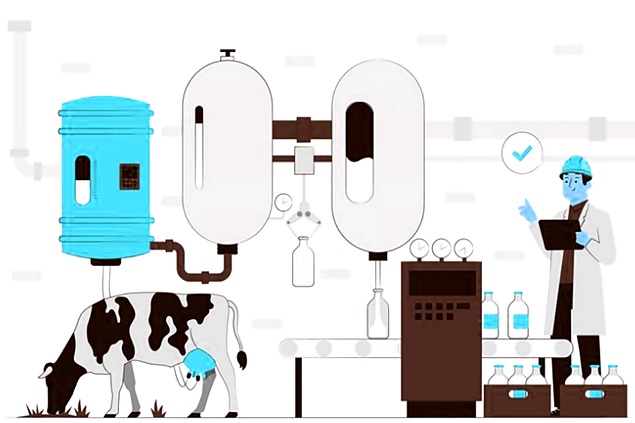1628

Start-ups in the food technology sector are utilizing precision fermentation technologies to offer an alternative to cow's milk. The future of this segment remains uncertain as conservative consumers may not quickly adopt synthetic food products, as noted by DairyGlobal.
"We're changing the process, not the food."
While lab-grown meat has been around for some time, lab-cultivated dairy is not something consumers frequently hear about.
"Synthetic milk is still a somewhat emerging industry, with many start-ups in their research and development phase. However, some companies are leading with products already on the market," comments Milena Bojovic, a PhD candidate at Macquarie University, Australia. She pointed to the US-based company Perfect Day as an example of a start-up working in this field.
"We're changing the process, not the food" – this is Perfect Day's slogan, reflecting the key feature of precision fermentation technologies. Ultimately, it will present products that cannot be distinguished from cow's milk. Milk from bioreactors will have the same taste, appearance, mouthfeel, and good nutritional value.
Milk obtained through precision fermentation, referred to as "synthetic milk," is environmentally friendly. "Since this new form of animal protein can be produced without a cow, there is a significant opportunity to reduce methane and carbon emissions, water pollution, land use, and animal welfare concerns," explains Bojovic.
Product Naming Controversy
In June 2023, the National Milk Producers Federation urged the US Food and Drug Administration to restrain the emerging segment, prohibiting start-ups like Perfect Day from using "milk" to describe their products.
American farmers insisted that naming products obtained through precision fermentation as milk is technically incorrect. Although such products may contain milk proteins, they do not meet federal identity standards for "milk." US dairy companies want the new products to be labeled in a way that demonstrates their synthetic nature. Proposed options include "synthetic whey beverage."
Bojovic says that how these new proteins are labeled, marketed, and used in final products will be a challenge for the industry in the coming years.
The growth of the precision fermentation segment could put pressure on conventional dairy farming. However, regulatory issues may only delay but are unlikely to prevent the expansion of the synthetic milk segment. "If synthetic milk doesn't compromise on consumers' desire for fair price, taste, and similar texture, then I believe it will easily fit into current food systems," she adds.
Conservatism Persists
In November 2023, the Italian government banned the sale of lab-grown meat, sending a clear signal that zootechnical products derived from certain production processes are unwelcome in the country.
"Italy is the first country in the world shielded from the social and economic risks of synthetic food," said Francesco Lollobrigida, Italy's Minister of Agriculture.
Italian society remains skeptical of synthetic meat and dairy, while politicians in other European countries, including Hungary and Poland, have called for measures against lab-grown foods.
Consumer conservatism will also hinder the prospects of synthetic milk outside the EU markets. Russian consumers remain cautious about transitioning to any alternative products, commented Maria Zhebit, Director of Communication at the Russian Dairy Producers Union.
Price remains a determining factor for customers when choosing food, says Zhebit, noting that synthetic milk products remain substantially more expensive compared to cow's milk in Russia.
"In Russia, regulations for greenhouse gas emissions are being implemented, but animal husbandry has so far been excluded. Emissions can be reduced by increasing animal productivity, which is currently observed in the leading enterprises of the industry," says Zhebit.
Global demand for dairy products is expected to increase by 2-3%, and according to Zhebit, no reduction in cow's milk production can be anticipated in the near future.
The Inevitable Future
While the short and medium-term prospects of the synthetic milk segment are not yet clear, analysts express confidence that products obtained through precision fermentation will find a place in the market in due course.
A 2019 report on the future of dairy products by Rethinkx, an independent think tank, found that by 2030, the US precision fermentation industry would create at least 700,000 jobs.
Together with increasing pressure to reduce carbon emissions, lower costs of synthetic milk production could revolutionize the global dairy industry.
"Given the pressing issues of climate change and environmental changes we are facing, we need efficient and effective interventions," Bojovic adds.
As precision fermentation technologies become more advanced, synthetic milk is expected to become more accessible over time.
One start-up, Aus All G Foods, based in Australia, has plans to make its synthetic milk cheaper than cow's milk in the short term.
"New proteins, such as synthetic milk, provide another way to increase sustainable food production," Bojovic added.





